The Role of Effective Leadership in Healthcare Organizations (Essay)
VerifiedAdded on 2022/11/17
|9
|2630
|380
Essay
AI Summary
This essay delves into the critical role of effective leadership within the healthcare industry, emphasizing its profound impact on organizational culture and service delivery. The essay begins with an introduction that highlights the importance of versatile leadership in addressing diverse challenges within healthcare settings. A literature review then examines how leadership defines policies, influences resource utilization, and shapes team dynamics. The analysis covers leadership training, decision-making skills, and the development of ethical practices. The essay emphasizes the significance of leadership development at all organizational levels, including the importance of communication, motivation, and contingent planning. The conclusion reinforces the need for strong leadership to navigate challenges, especially in ethical and emergency situations, and underscores the benefits of leadership development for improved service delivery and organizational success. The references provide a comprehensive list of sources used to support the arguments presented.
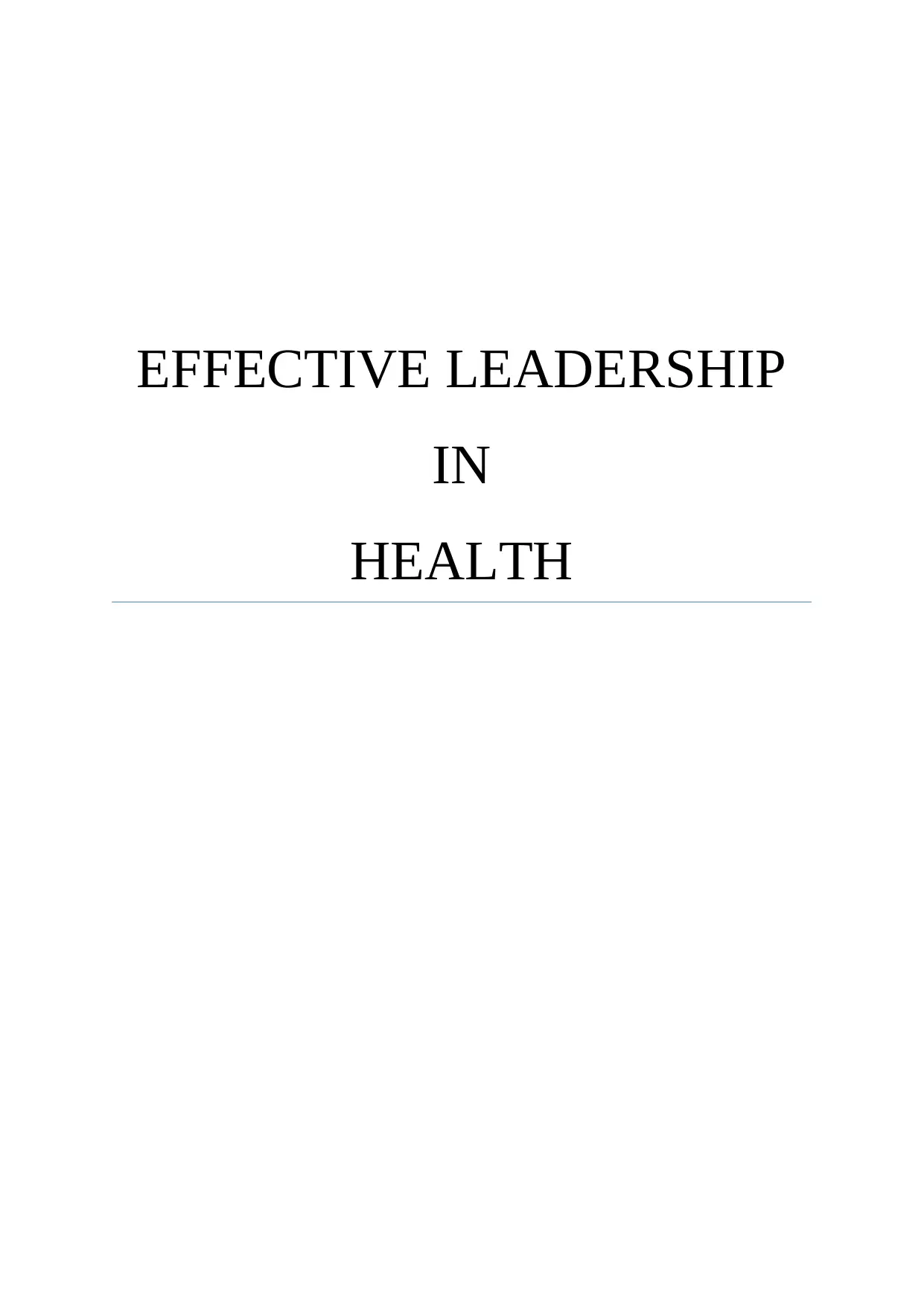
EFFECTIVE LEADERSHIP
IN
HEALTH
IN
HEALTH
Paraphrase This Document
Need a fresh take? Get an instant paraphrase of this document with our AI Paraphraser
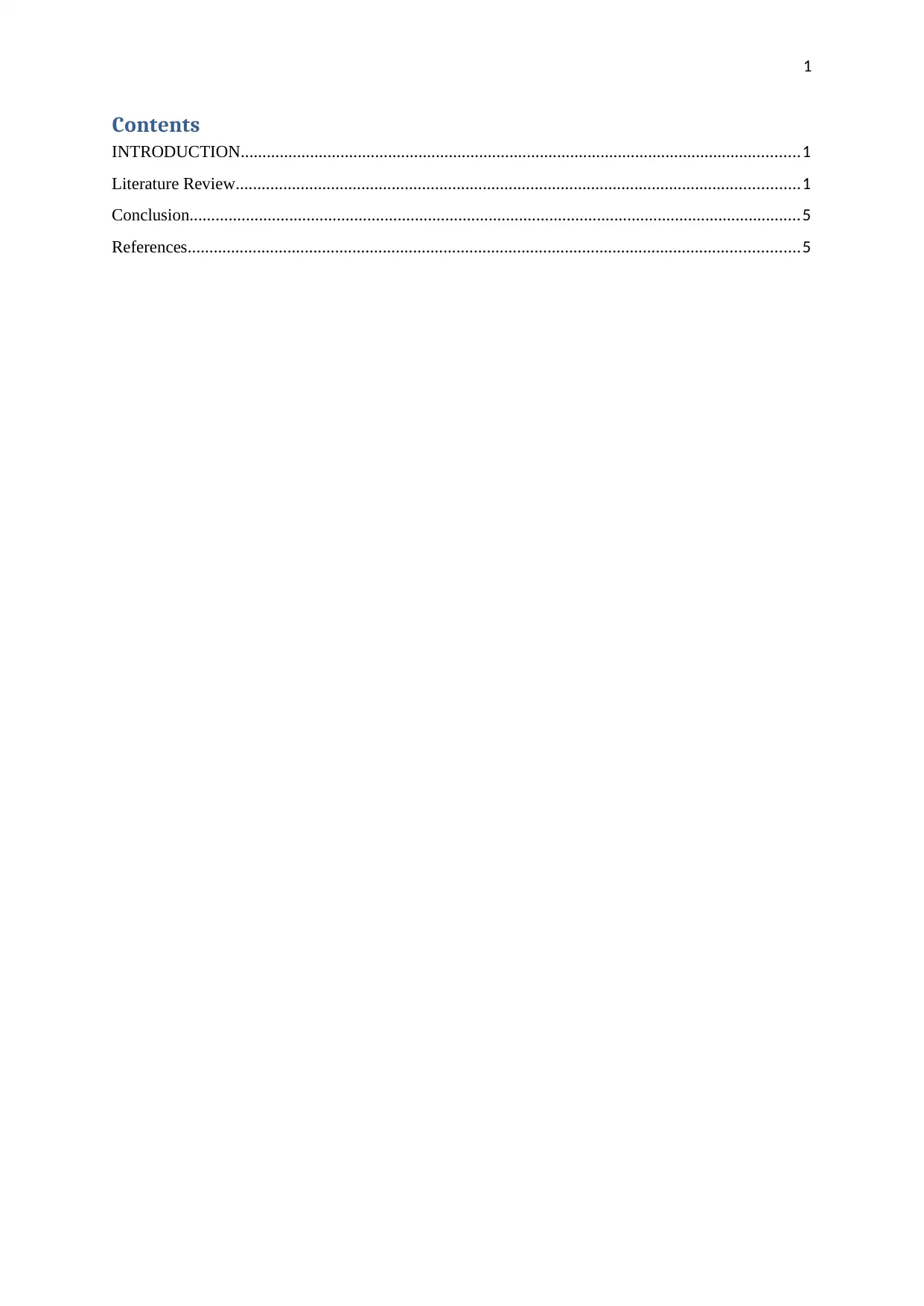
1
Contents
INTRODUCTION.................................................................................................................................1
Literature Review..................................................................................................................................1
Conclusion.............................................................................................................................................5
References.............................................................................................................................................5
Contents
INTRODUCTION.................................................................................................................................1
Literature Review..................................................................................................................................1
Conclusion.............................................................................................................................................5
References.............................................................................................................................................5
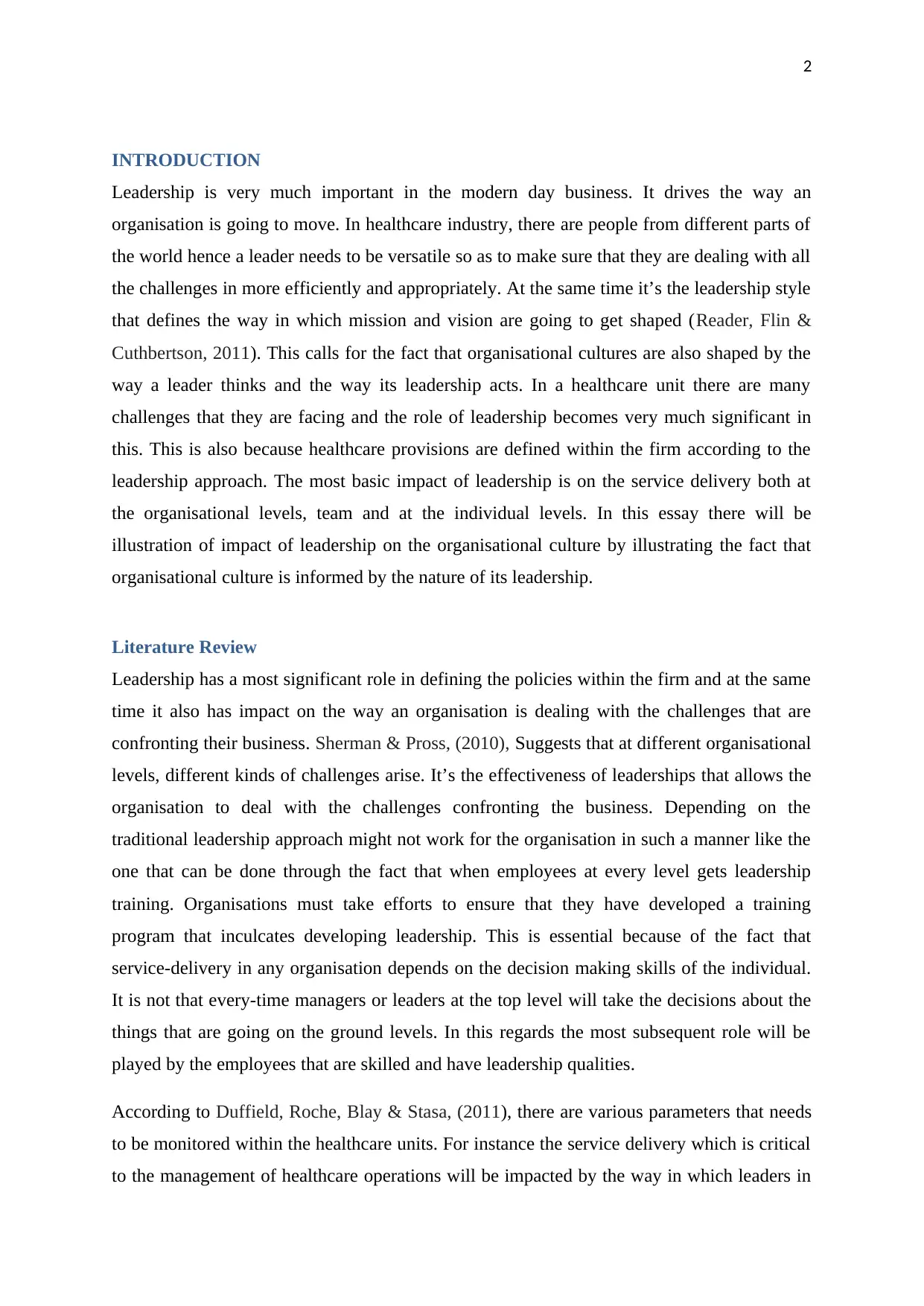
2
INTRODUCTION
Leadership is very much important in the modern day business. It drives the way an
organisation is going to move. In healthcare industry, there are people from different parts of
the world hence a leader needs to be versatile so as to make sure that they are dealing with all
the challenges in more efficiently and appropriately. At the same time it’s the leadership style
that defines the way in which mission and vision are going to get shaped (Reader, Flin &
Cuthbertson, 2011). This calls for the fact that organisational cultures are also shaped by the
way a leader thinks and the way its leadership acts. In a healthcare unit there are many
challenges that they are facing and the role of leadership becomes very much significant in
this. This is also because healthcare provisions are defined within the firm according to the
leadership approach. The most basic impact of leadership is on the service delivery both at
the organisational levels, team and at the individual levels. In this essay there will be
illustration of impact of leadership on the organisational culture by illustrating the fact that
organisational culture is informed by the nature of its leadership.
Literature Review
Leadership has a most significant role in defining the policies within the firm and at the same
time it also has impact on the way an organisation is dealing with the challenges that are
confronting their business. Sherman & Pross, (2010), Suggests that at different organisational
levels, different kinds of challenges arise. It’s the effectiveness of leaderships that allows the
organisation to deal with the challenges confronting the business. Depending on the
traditional leadership approach might not work for the organisation in such a manner like the
one that can be done through the fact that when employees at every level gets leadership
training. Organisations must take efforts to ensure that they have developed a training
program that inculcates developing leadership. This is essential because of the fact that
service-delivery in any organisation depends on the decision making skills of the individual.
It is not that every-time managers or leaders at the top level will take the decisions about the
things that are going on the ground levels. In this regards the most subsequent role will be
played by the employees that are skilled and have leadership qualities.
According to Duffield, Roche, Blay & Stasa, (2011), there are various parameters that needs
to be monitored within the healthcare units. For instance the service delivery which is critical
to the management of healthcare operations will be impacted by the way in which leaders in
INTRODUCTION
Leadership is very much important in the modern day business. It drives the way an
organisation is going to move. In healthcare industry, there are people from different parts of
the world hence a leader needs to be versatile so as to make sure that they are dealing with all
the challenges in more efficiently and appropriately. At the same time it’s the leadership style
that defines the way in which mission and vision are going to get shaped (Reader, Flin &
Cuthbertson, 2011). This calls for the fact that organisational cultures are also shaped by the
way a leader thinks and the way its leadership acts. In a healthcare unit there are many
challenges that they are facing and the role of leadership becomes very much significant in
this. This is also because healthcare provisions are defined within the firm according to the
leadership approach. The most basic impact of leadership is on the service delivery both at
the organisational levels, team and at the individual levels. In this essay there will be
illustration of impact of leadership on the organisational culture by illustrating the fact that
organisational culture is informed by the nature of its leadership.
Literature Review
Leadership has a most significant role in defining the policies within the firm and at the same
time it also has impact on the way an organisation is dealing with the challenges that are
confronting their business. Sherman & Pross, (2010), Suggests that at different organisational
levels, different kinds of challenges arise. It’s the effectiveness of leaderships that allows the
organisation to deal with the challenges confronting the business. Depending on the
traditional leadership approach might not work for the organisation in such a manner like the
one that can be done through the fact that when employees at every level gets leadership
training. Organisations must take efforts to ensure that they have developed a training
program that inculcates developing leadership. This is essential because of the fact that
service-delivery in any organisation depends on the decision making skills of the individual.
It is not that every-time managers or leaders at the top level will take the decisions about the
things that are going on the ground levels. In this regards the most subsequent role will be
played by the employees that are skilled and have leadership qualities.
According to Duffield, Roche, Blay & Stasa, (2011), there are various parameters that needs
to be monitored within the healthcare units. For instance the service delivery which is critical
to the management of healthcare operations will be impacted by the way in which leaders in
⊘ This is a preview!⊘
Do you want full access?
Subscribe today to unlock all pages.

Trusted by 1+ million students worldwide
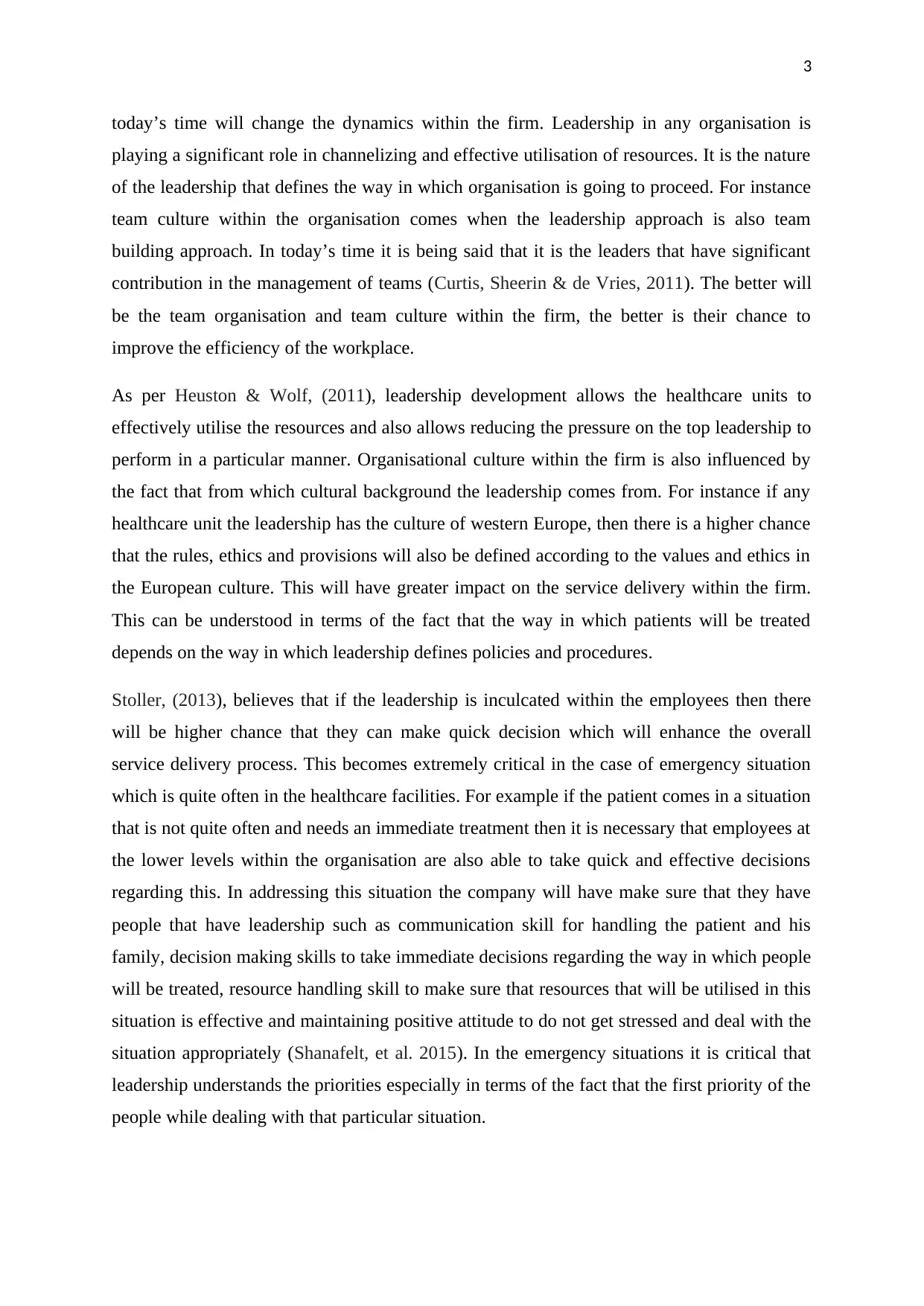
3
today’s time will change the dynamics within the firm. Leadership in any organisation is
playing a significant role in channelizing and effective utilisation of resources. It is the nature
of the leadership that defines the way in which organisation is going to proceed. For instance
team culture within the organisation comes when the leadership approach is also team
building approach. In today’s time it is being said that it is the leaders that have significant
contribution in the management of teams (Curtis, Sheerin & de Vries, 2011). The better will
be the team organisation and team culture within the firm, the better is their chance to
improve the efficiency of the workplace.
As per Heuston & Wolf, (2011), leadership development allows the healthcare units to
effectively utilise the resources and also allows reducing the pressure on the top leadership to
perform in a particular manner. Organisational culture within the firm is also influenced by
the fact that from which cultural background the leadership comes from. For instance if any
healthcare unit the leadership has the culture of western Europe, then there is a higher chance
that the rules, ethics and provisions will also be defined according to the values and ethics in
the European culture. This will have greater impact on the service delivery within the firm.
This can be understood in terms of the fact that the way in which patients will be treated
depends on the way in which leadership defines policies and procedures.
Stoller, (2013), believes that if the leadership is inculcated within the employees then there
will be higher chance that they can make quick decision which will enhance the overall
service delivery process. This becomes extremely critical in the case of emergency situation
which is quite often in the healthcare facilities. For example if the patient comes in a situation
that is not quite often and needs an immediate treatment then it is necessary that employees at
the lower levels within the organisation are also able to take quick and effective decisions
regarding this. In addressing this situation the company will have make sure that they have
people that have leadership such as communication skill for handling the patient and his
family, decision making skills to take immediate decisions regarding the way in which people
will be treated, resource handling skill to make sure that resources that will be utilised in this
situation is effective and maintaining positive attitude to do not get stressed and deal with the
situation appropriately (Shanafelt, et al. 2015). In the emergency situations it is critical that
leadership understands the priorities especially in terms of the fact that the first priority of the
people while dealing with that particular situation.
today’s time will change the dynamics within the firm. Leadership in any organisation is
playing a significant role in channelizing and effective utilisation of resources. It is the nature
of the leadership that defines the way in which organisation is going to proceed. For instance
team culture within the organisation comes when the leadership approach is also team
building approach. In today’s time it is being said that it is the leaders that have significant
contribution in the management of teams (Curtis, Sheerin & de Vries, 2011). The better will
be the team organisation and team culture within the firm, the better is their chance to
improve the efficiency of the workplace.
As per Heuston & Wolf, (2011), leadership development allows the healthcare units to
effectively utilise the resources and also allows reducing the pressure on the top leadership to
perform in a particular manner. Organisational culture within the firm is also influenced by
the fact that from which cultural background the leadership comes from. For instance if any
healthcare unit the leadership has the culture of western Europe, then there is a higher chance
that the rules, ethics and provisions will also be defined according to the values and ethics in
the European culture. This will have greater impact on the service delivery within the firm.
This can be understood in terms of the fact that the way in which patients will be treated
depends on the way in which leadership defines policies and procedures.
Stoller, (2013), believes that if the leadership is inculcated within the employees then there
will be higher chance that they can make quick decision which will enhance the overall
service delivery process. This becomes extremely critical in the case of emergency situation
which is quite often in the healthcare facilities. For example if the patient comes in a situation
that is not quite often and needs an immediate treatment then it is necessary that employees at
the lower levels within the organisation are also able to take quick and effective decisions
regarding this. In addressing this situation the company will have make sure that they have
people that have leadership such as communication skill for handling the patient and his
family, decision making skills to take immediate decisions regarding the way in which people
will be treated, resource handling skill to make sure that resources that will be utilised in this
situation is effective and maintaining positive attitude to do not get stressed and deal with the
situation appropriately (Shanafelt, et al. 2015). In the emergency situations it is critical that
leadership understands the priorities especially in terms of the fact that the first priority of the
people while dealing with that particular situation.
Paraphrase This Document
Need a fresh take? Get an instant paraphrase of this document with our AI Paraphraser
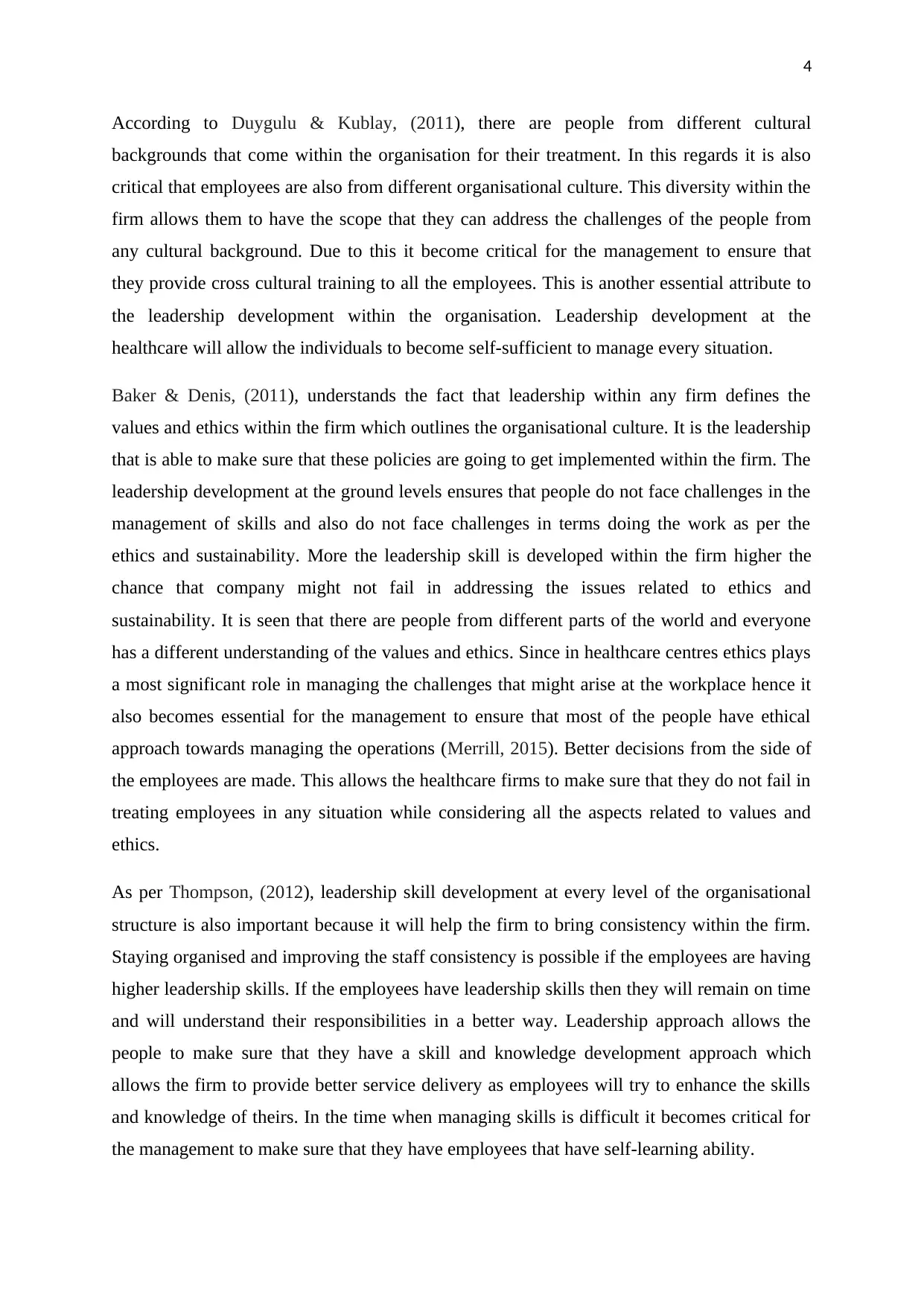
4
According to Duygulu & Kublay, (2011), there are people from different cultural
backgrounds that come within the organisation for their treatment. In this regards it is also
critical that employees are also from different organisational culture. This diversity within the
firm allows them to have the scope that they can address the challenges of the people from
any cultural background. Due to this it become critical for the management to ensure that
they provide cross cultural training to all the employees. This is another essential attribute to
the leadership development within the organisation. Leadership development at the
healthcare will allow the individuals to become self-sufficient to manage every situation.
Baker & Denis, (2011), understands the fact that leadership within any firm defines the
values and ethics within the firm which outlines the organisational culture. It is the leadership
that is able to make sure that these policies are going to get implemented within the firm. The
leadership development at the ground levels ensures that people do not face challenges in the
management of skills and also do not face challenges in terms doing the work as per the
ethics and sustainability. More the leadership skill is developed within the firm higher the
chance that company might not fail in addressing the issues related to ethics and
sustainability. It is seen that there are people from different parts of the world and everyone
has a different understanding of the values and ethics. Since in healthcare centres ethics plays
a most significant role in managing the challenges that might arise at the workplace hence it
also becomes essential for the management to ensure that most of the people have ethical
approach towards managing the operations (Merrill, 2015). Better decisions from the side of
the employees are made. This allows the healthcare firms to make sure that they do not fail in
treating employees in any situation while considering all the aspects related to values and
ethics.
As per Thompson, (2012), leadership skill development at every level of the organisational
structure is also important because it will help the firm to bring consistency within the firm.
Staying organised and improving the staff consistency is possible if the employees are having
higher leadership skills. If the employees have leadership skills then they will remain on time
and will understand their responsibilities in a better way. Leadership approach allows the
people to make sure that they have a skill and knowledge development approach which
allows the firm to provide better service delivery as employees will try to enhance the skills
and knowledge of theirs. In the time when managing skills is difficult it becomes critical for
the management to make sure that they have employees that have self-learning ability.
According to Duygulu & Kublay, (2011), there are people from different cultural
backgrounds that come within the organisation for their treatment. In this regards it is also
critical that employees are also from different organisational culture. This diversity within the
firm allows them to have the scope that they can address the challenges of the people from
any cultural background. Due to this it become critical for the management to ensure that
they provide cross cultural training to all the employees. This is another essential attribute to
the leadership development within the organisation. Leadership development at the
healthcare will allow the individuals to become self-sufficient to manage every situation.
Baker & Denis, (2011), understands the fact that leadership within any firm defines the
values and ethics within the firm which outlines the organisational culture. It is the leadership
that is able to make sure that these policies are going to get implemented within the firm. The
leadership development at the ground levels ensures that people do not face challenges in the
management of skills and also do not face challenges in terms doing the work as per the
ethics and sustainability. More the leadership skill is developed within the firm higher the
chance that company might not fail in addressing the issues related to ethics and
sustainability. It is seen that there are people from different parts of the world and everyone
has a different understanding of the values and ethics. Since in healthcare centres ethics plays
a most significant role in managing the challenges that might arise at the workplace hence it
also becomes essential for the management to ensure that most of the people have ethical
approach towards managing the operations (Merrill, 2015). Better decisions from the side of
the employees are made. This allows the healthcare firms to make sure that they do not fail in
treating employees in any situation while considering all the aspects related to values and
ethics.
As per Thompson, (2012), leadership skill development at every level of the organisational
structure is also important because it will help the firm to bring consistency within the firm.
Staying organised and improving the staff consistency is possible if the employees are having
higher leadership skills. If the employees have leadership skills then they will remain on time
and will understand their responsibilities in a better way. Leadership approach allows the
people to make sure that they have a skill and knowledge development approach which
allows the firm to provide better service delivery as employees will try to enhance the skills
and knowledge of theirs. In the time when managing skills is difficult it becomes critical for
the management to make sure that they have employees that have self-learning ability.
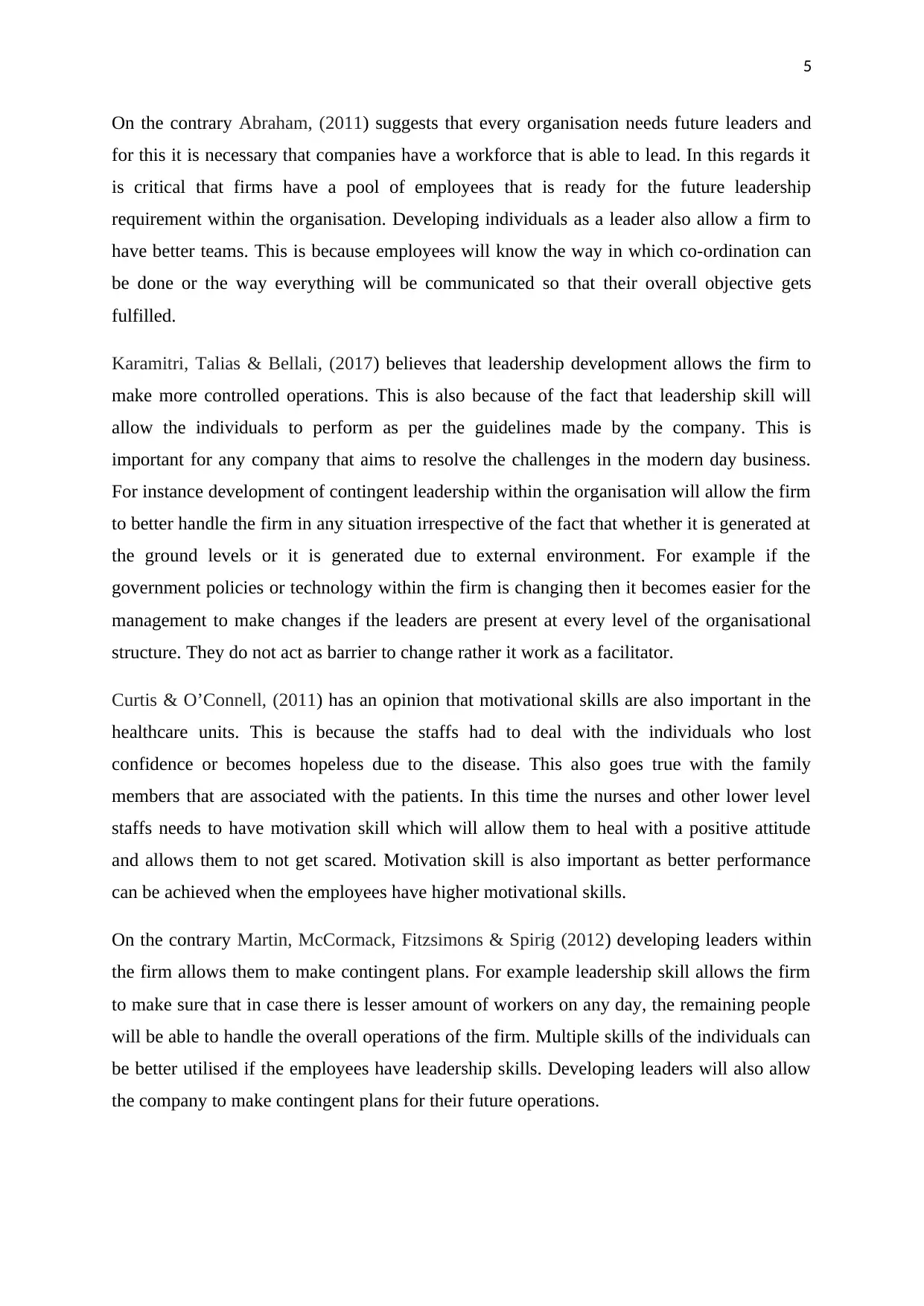
5
On the contrary Abraham, (2011) suggests that every organisation needs future leaders and
for this it is necessary that companies have a workforce that is able to lead. In this regards it
is critical that firms have a pool of employees that is ready for the future leadership
requirement within the organisation. Developing individuals as a leader also allow a firm to
have better teams. This is because employees will know the way in which co-ordination can
be done or the way everything will be communicated so that their overall objective gets
fulfilled.
Karamitri, Talias & Bellali, (2017) believes that leadership development allows the firm to
make more controlled operations. This is also because of the fact that leadership skill will
allow the individuals to perform as per the guidelines made by the company. This is
important for any company that aims to resolve the challenges in the modern day business.
For instance development of contingent leadership within the organisation will allow the firm
to better handle the firm in any situation irrespective of the fact that whether it is generated at
the ground levels or it is generated due to external environment. For example if the
government policies or technology within the firm is changing then it becomes easier for the
management to make changes if the leaders are present at every level of the organisational
structure. They do not act as barrier to change rather it work as a facilitator.
Curtis & O’Connell, (2011) has an opinion that motivational skills are also important in the
healthcare units. This is because the staffs had to deal with the individuals who lost
confidence or becomes hopeless due to the disease. This also goes true with the family
members that are associated with the patients. In this time the nurses and other lower level
staffs needs to have motivation skill which will allow them to heal with a positive attitude
and allows them to not get scared. Motivation skill is also important as better performance
can be achieved when the employees have higher motivational skills.
On the contrary Martin, McCormack, Fitzsimons & Spirig (2012) developing leaders within
the firm allows them to make contingent plans. For example leadership skill allows the firm
to make sure that in case there is lesser amount of workers on any day, the remaining people
will be able to handle the overall operations of the firm. Multiple skills of the individuals can
be better utilised if the employees have leadership skills. Developing leaders will also allow
the company to make contingent plans for their future operations.
On the contrary Abraham, (2011) suggests that every organisation needs future leaders and
for this it is necessary that companies have a workforce that is able to lead. In this regards it
is critical that firms have a pool of employees that is ready for the future leadership
requirement within the organisation. Developing individuals as a leader also allow a firm to
have better teams. This is because employees will know the way in which co-ordination can
be done or the way everything will be communicated so that their overall objective gets
fulfilled.
Karamitri, Talias & Bellali, (2017) believes that leadership development allows the firm to
make more controlled operations. This is also because of the fact that leadership skill will
allow the individuals to perform as per the guidelines made by the company. This is
important for any company that aims to resolve the challenges in the modern day business.
For instance development of contingent leadership within the organisation will allow the firm
to better handle the firm in any situation irrespective of the fact that whether it is generated at
the ground levels or it is generated due to external environment. For example if the
government policies or technology within the firm is changing then it becomes easier for the
management to make changes if the leaders are present at every level of the organisational
structure. They do not act as barrier to change rather it work as a facilitator.
Curtis & O’Connell, (2011) has an opinion that motivational skills are also important in the
healthcare units. This is because the staffs had to deal with the individuals who lost
confidence or becomes hopeless due to the disease. This also goes true with the family
members that are associated with the patients. In this time the nurses and other lower level
staffs needs to have motivation skill which will allow them to heal with a positive attitude
and allows them to not get scared. Motivation skill is also important as better performance
can be achieved when the employees have higher motivational skills.
On the contrary Martin, McCormack, Fitzsimons & Spirig (2012) developing leaders within
the firm allows them to make contingent plans. For example leadership skill allows the firm
to make sure that in case there is lesser amount of workers on any day, the remaining people
will be able to handle the overall operations of the firm. Multiple skills of the individuals can
be better utilised if the employees have leadership skills. Developing leaders will also allow
the company to make contingent plans for their future operations.
⊘ This is a preview!⊘
Do you want full access?
Subscribe today to unlock all pages.

Trusted by 1+ million students worldwide
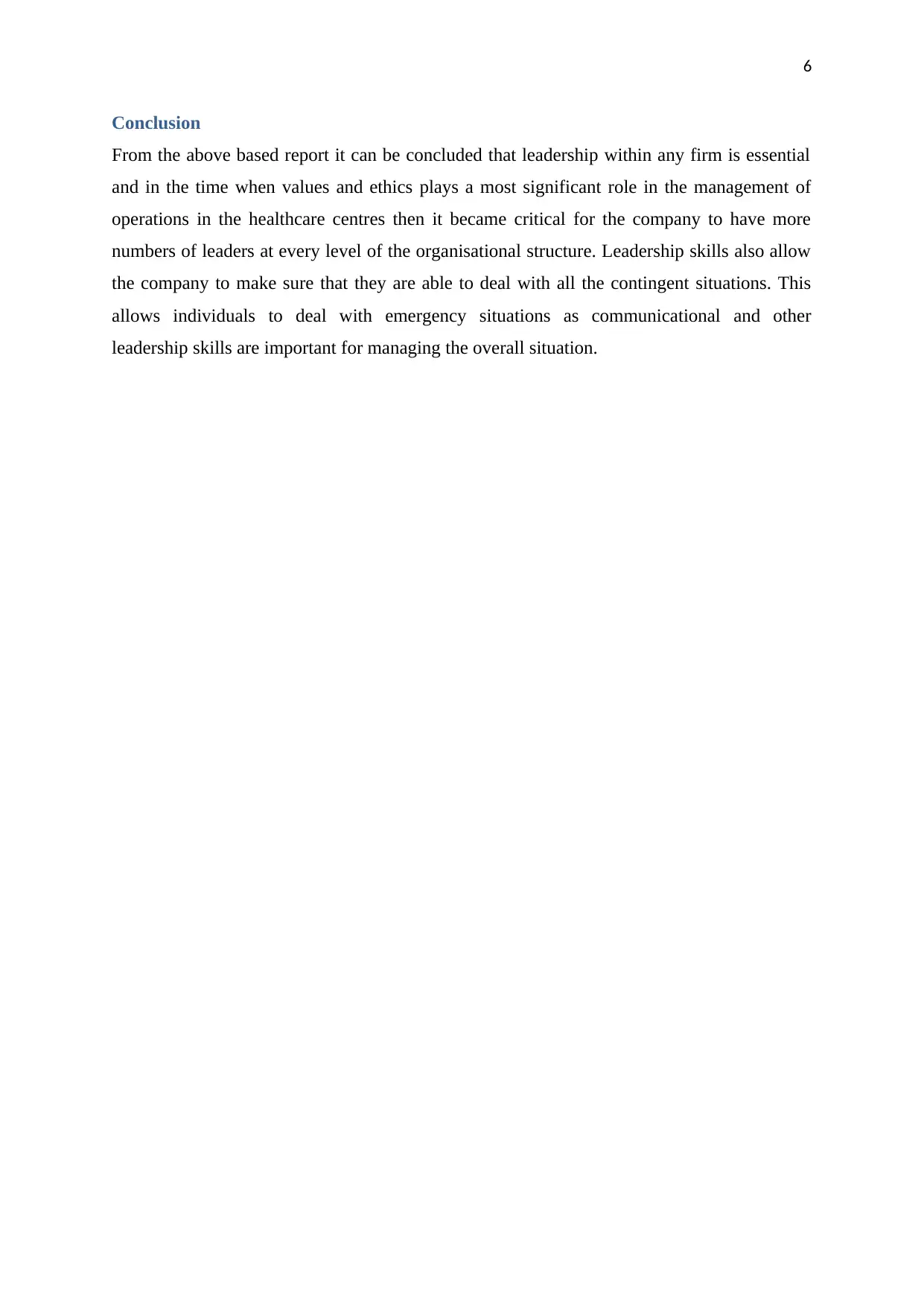
6
Conclusion
From the above based report it can be concluded that leadership within any firm is essential
and in the time when values and ethics plays a most significant role in the management of
operations in the healthcare centres then it became critical for the company to have more
numbers of leaders at every level of the organisational structure. Leadership skills also allow
the company to make sure that they are able to deal with all the contingent situations. This
allows individuals to deal with emergency situations as communicational and other
leadership skills are important for managing the overall situation.
Conclusion
From the above based report it can be concluded that leadership within any firm is essential
and in the time when values and ethics plays a most significant role in the management of
operations in the healthcare centres then it became critical for the company to have more
numbers of leaders at every level of the organisational structure. Leadership skills also allow
the company to make sure that they are able to deal with all the contingent situations. This
allows individuals to deal with emergency situations as communicational and other
leadership skills are important for managing the overall situation.
Paraphrase This Document
Need a fresh take? Get an instant paraphrase of this document with our AI Paraphraser
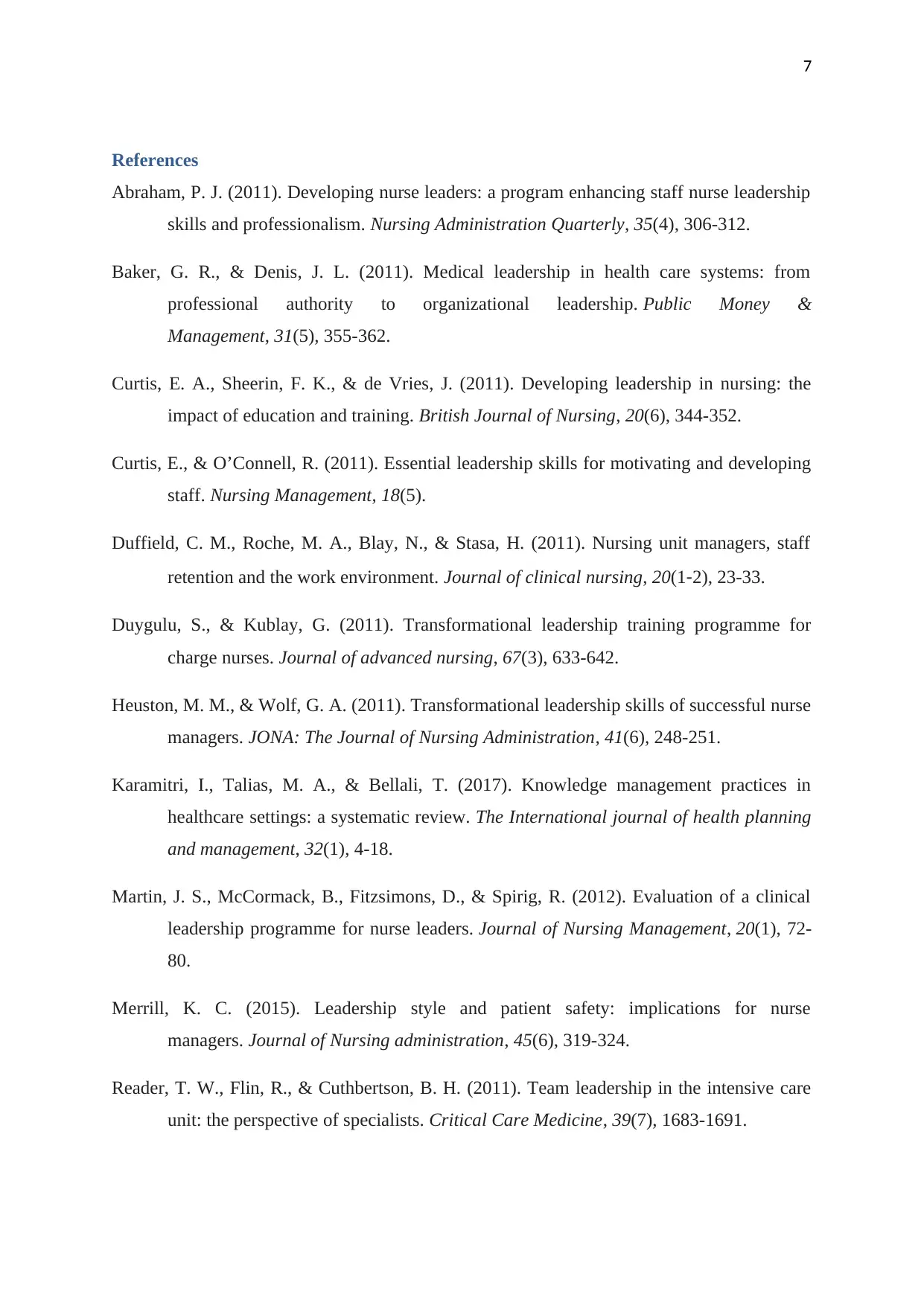
7
References
Abraham, P. J. (2011). Developing nurse leaders: a program enhancing staff nurse leadership
skills and professionalism. Nursing Administration Quarterly, 35(4), 306-312.
Baker, G. R., & Denis, J. L. (2011). Medical leadership in health care systems: from
professional authority to organizational leadership. Public Money &
Management, 31(5), 355-362.
Curtis, E. A., Sheerin, F. K., & de Vries, J. (2011). Developing leadership in nursing: the
impact of education and training. British Journal of Nursing, 20(6), 344-352.
Curtis, E., & O’Connell, R. (2011). Essential leadership skills for motivating and developing
staff. Nursing Management, 18(5).
Duffield, C. M., Roche, M. A., Blay, N., & Stasa, H. (2011). Nursing unit managers, staff
retention and the work environment. Journal of clinical nursing, 20(1‐2), 23-33.
Duygulu, S., & Kublay, G. (2011). Transformational leadership training programme for
charge nurses. Journal of advanced nursing, 67(3), 633-642.
Heuston, M. M., & Wolf, G. A. (2011). Transformational leadership skills of successful nurse
managers. JONA: The Journal of Nursing Administration, 41(6), 248-251.
Karamitri, I., Talias, M. A., & Bellali, T. (2017). Knowledge management practices in
healthcare settings: a systematic review. The International journal of health planning
and management, 32(1), 4-18.
Martin, J. S., McCormack, B., Fitzsimons, D., & Spirig, R. (2012). Evaluation of a clinical
leadership programme for nurse leaders. Journal of Nursing Management, 20(1), 72-
80.
Merrill, K. C. (2015). Leadership style and patient safety: implications for nurse
managers. Journal of Nursing administration, 45(6), 319-324.
Reader, T. W., Flin, R., & Cuthbertson, B. H. (2011). Team leadership in the intensive care
unit: the perspective of specialists. Critical Care Medicine, 39(7), 1683-1691.
References
Abraham, P. J. (2011). Developing nurse leaders: a program enhancing staff nurse leadership
skills and professionalism. Nursing Administration Quarterly, 35(4), 306-312.
Baker, G. R., & Denis, J. L. (2011). Medical leadership in health care systems: from
professional authority to organizational leadership. Public Money &
Management, 31(5), 355-362.
Curtis, E. A., Sheerin, F. K., & de Vries, J. (2011). Developing leadership in nursing: the
impact of education and training. British Journal of Nursing, 20(6), 344-352.
Curtis, E., & O’Connell, R. (2011). Essential leadership skills for motivating and developing
staff. Nursing Management, 18(5).
Duffield, C. M., Roche, M. A., Blay, N., & Stasa, H. (2011). Nursing unit managers, staff
retention and the work environment. Journal of clinical nursing, 20(1‐2), 23-33.
Duygulu, S., & Kublay, G. (2011). Transformational leadership training programme for
charge nurses. Journal of advanced nursing, 67(3), 633-642.
Heuston, M. M., & Wolf, G. A. (2011). Transformational leadership skills of successful nurse
managers. JONA: The Journal of Nursing Administration, 41(6), 248-251.
Karamitri, I., Talias, M. A., & Bellali, T. (2017). Knowledge management practices in
healthcare settings: a systematic review. The International journal of health planning
and management, 32(1), 4-18.
Martin, J. S., McCormack, B., Fitzsimons, D., & Spirig, R. (2012). Evaluation of a clinical
leadership programme for nurse leaders. Journal of Nursing Management, 20(1), 72-
80.
Merrill, K. C. (2015). Leadership style and patient safety: implications for nurse
managers. Journal of Nursing administration, 45(6), 319-324.
Reader, T. W., Flin, R., & Cuthbertson, B. H. (2011). Team leadership in the intensive care
unit: the perspective of specialists. Critical Care Medicine, 39(7), 1683-1691.
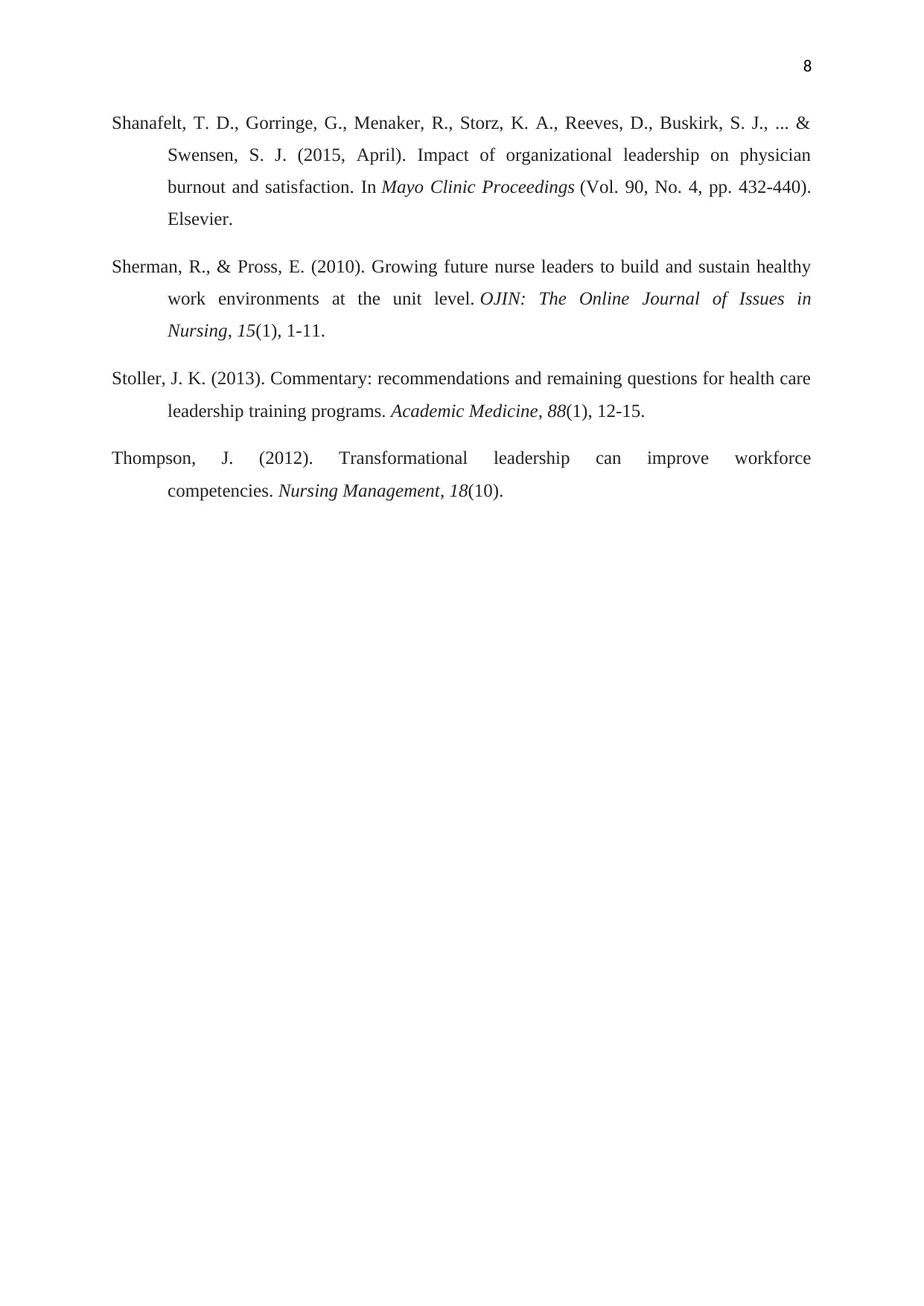
8
Shanafelt, T. D., Gorringe, G., Menaker, R., Storz, K. A., Reeves, D., Buskirk, S. J., ... &
Swensen, S. J. (2015, April). Impact of organizational leadership on physician
burnout and satisfaction. In Mayo Clinic Proceedings (Vol. 90, No. 4, pp. 432-440).
Elsevier.
Sherman, R., & Pross, E. (2010). Growing future nurse leaders to build and sustain healthy
work environments at the unit level. OJIN: The Online Journal of Issues in
Nursing, 15(1), 1-11.
Stoller, J. K. (2013). Commentary: recommendations and remaining questions for health care
leadership training programs. Academic Medicine, 88(1), 12-15.
Thompson, J. (2012). Transformational leadership can improve workforce
competencies. Nursing Management, 18(10).
Shanafelt, T. D., Gorringe, G., Menaker, R., Storz, K. A., Reeves, D., Buskirk, S. J., ... &
Swensen, S. J. (2015, April). Impact of organizational leadership on physician
burnout and satisfaction. In Mayo Clinic Proceedings (Vol. 90, No. 4, pp. 432-440).
Elsevier.
Sherman, R., & Pross, E. (2010). Growing future nurse leaders to build and sustain healthy
work environments at the unit level. OJIN: The Online Journal of Issues in
Nursing, 15(1), 1-11.
Stoller, J. K. (2013). Commentary: recommendations and remaining questions for health care
leadership training programs. Academic Medicine, 88(1), 12-15.
Thompson, J. (2012). Transformational leadership can improve workforce
competencies. Nursing Management, 18(10).
⊘ This is a preview!⊘
Do you want full access?
Subscribe today to unlock all pages.

Trusted by 1+ million students worldwide
1 out of 9
Related Documents
Your All-in-One AI-Powered Toolkit for Academic Success.
+13062052269
info@desklib.com
Available 24*7 on WhatsApp / Email
![[object Object]](/_next/static/media/star-bottom.7253800d.svg)
Unlock your academic potential
Copyright © 2020–2026 A2Z Services. All Rights Reserved. Developed and managed by ZUCOL.




